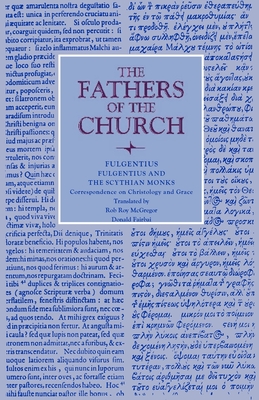Fulgentius and the Scythian Monks: Correspondence on Christology and Grace

Fulgentius and the Scythian Monks: Correspondence on Christology and Grace
St. Fulgentius of Ruspe was perhaps the most brilliant North African theologian in the era after St. Augustine's death. He wrote widely on theological and moral issues. Between the years AD 519 and 523, Fulgentius engaged in correspondence with a group of Latin-speaking monks from Scythia, and that correspondence is translated into English-almost all of it for the first time-in this volume. The correspondence is significant because it stands at the intersection of two great theological discussions: the primarily Eastern Christological controversies between the Fourth Ecumenical Council in 451 and the Fifth in 553, and the largely Western Semi-Pelagian controversy, which ran from 427 to the Second Synod of Orange in 529. Contemporary Western scholars normally treat these controversies over Christ and grace separately, but there were noteworthy points of contact between the two discussions, and Fulgentius and the Scythian monks were the ones who drew the connections between Christology and grace most strongly. These connections suggest that we today may do well to treat Christology and grace more as two sides of the same coin than as separate theological issues. Both sets of issues deal fundamentally with the relation between God and humanity: Christological questions ask how the divine and human are related in the person of the Savior, and grace-related questions ask how the divine and human are linked in the conversion, Christian life, and final salvation of each Christian. Thus, Fulgentius's correspondence with the Scythian monks can do more than simply aid understanding of sixth-century Byzantine/Roman theology. It can also contribute to our contemporary thinking on the relation between two of the Christian faith's most central doctrines.
PRP: 372.00 Lei
Acesta este Pretul Recomandat de Producator. Pretul de vanzare al produsului este afisat mai jos.
334.80Lei
334.80Lei
372.00 LeiLivrare in 2-4 saptamani
Descrierea produsului
St. Fulgentius of Ruspe was perhaps the most brilliant North African theologian in the era after St. Augustine's death. He wrote widely on theological and moral issues. Between the years AD 519 and 523, Fulgentius engaged in correspondence with a group of Latin-speaking monks from Scythia, and that correspondence is translated into English-almost all of it for the first time-in this volume. The correspondence is significant because it stands at the intersection of two great theological discussions: the primarily Eastern Christological controversies between the Fourth Ecumenical Council in 451 and the Fifth in 553, and the largely Western Semi-Pelagian controversy, which ran from 427 to the Second Synod of Orange in 529. Contemporary Western scholars normally treat these controversies over Christ and grace separately, but there were noteworthy points of contact between the two discussions, and Fulgentius and the Scythian monks were the ones who drew the connections between Christology and grace most strongly. These connections suggest that we today may do well to treat Christology and grace more as two sides of the same coin than as separate theological issues. Both sets of issues deal fundamentally with the relation between God and humanity: Christological questions ask how the divine and human are related in the person of the Savior, and grace-related questions ask how the divine and human are linked in the conversion, Christian life, and final salvation of each Christian. Thus, Fulgentius's correspondence with the Scythian monks can do more than simply aid understanding of sixth-century Byzantine/Roman theology. It can also contribute to our contemporary thinking on the relation between two of the Christian faith's most central doctrines.
Detaliile produsului









